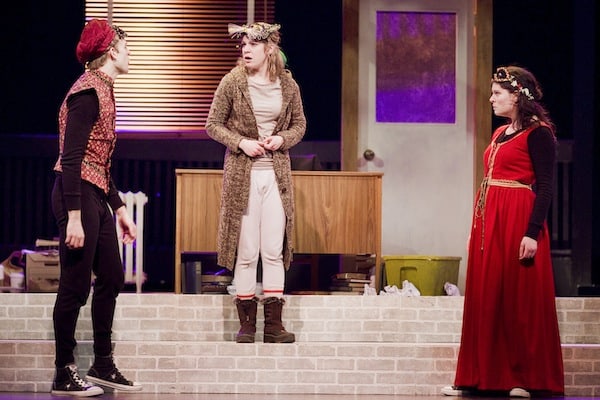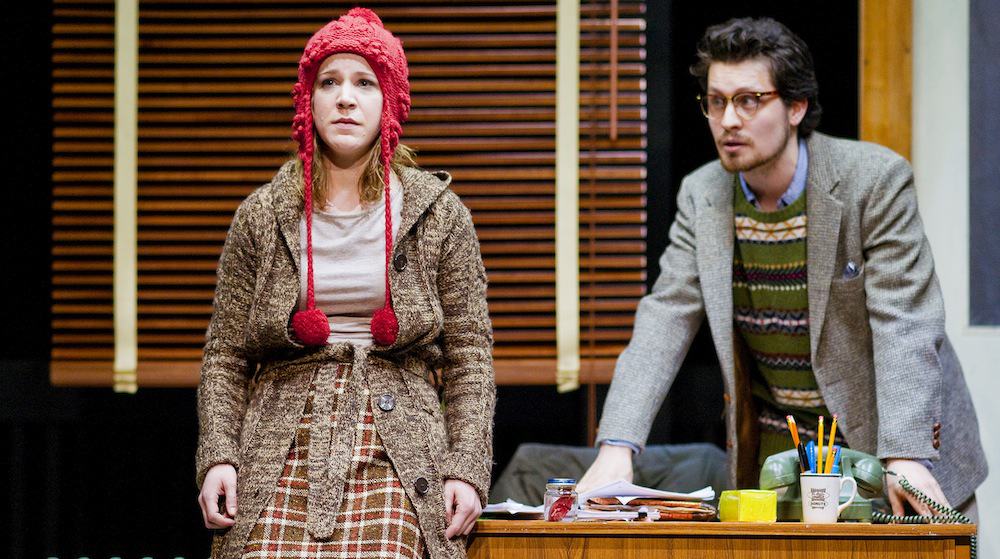Goodnight Desdemona (Good Morning Juliet)‘s first line is a question:
“What is alchemy?” This question serves as a premise for the rest of the play as it sets the tone for what is to come. Directed by Carly Chamberlain, this production seeks to ask questions, not just give answers. What would you change if you could go back and take part in one of Shakespeare’s plays?
On one hand, it is the playful sense that makes it successful. Lesley Robertson is excellent as the dorky young English professor, Constance Ledbelly, who leads the performance with strength. Ledbelly is a character living in the shadow of Claude Night (Nicholas Porteous), a fellow academic who abuses his seniority and has Constance do all his dirty work.
Ledbelly is hardworking, diligent and even allows for her work to be published under Night’s name. When he reveals that an Oxford post beckons, Ledbelly is 29, left in a dead-end job, and depressed. She decides to throw away the contents of her office, to leave work and start fresh — only to miraculously vanish into the magical bin herself
It is with this narrative turn that the play bursts into life. Thrust into Shakespeare’s Othello, Ledbelly instantly reveals Iago (Nathan Bitton) for what he is, a jealous meddler, distorting the narrative trajectory. The strong feminist stance of Ann-Marie MacDonald’s 1988 play is preserved in this 2014 production, as Ledbelly sides with Desdemona and gives her the prominence she was denied in the seventeenth century. Her presence liberates both Desdemona and Juliet, to hilarious effect. Turning away from Desdemona and addressing her audience in one of the play’s funniest moments, Ledbelly whispers, “Shakespeare really toned her down, ey?”
Ledbelly’s aim, both in reality and in the magical parallel world of Othello and Romeo & Juliet, was to prove that the two tragedies were initially comedies. Ledbelly talks of the possibility of a posthumous doctorate, which is a concept that is as uncomfortable as it is funny. The alliance of levity and seriousness has its roots with the Bard, and is but one of many devices employed by MacDonald in writing back to Shakespeare.
Ledbelly’s self-discovery ultimately takes place in her subconscious. It is there that she rediscovers her sense of self. She learns from Desdemona and Juliet just as they learn from her, and the three heroines dominate stage time throughout. Ledbelly pledges to Desdemona that she will “stand out in that field and cry, ‘Bullshit!'” The feminist stance suggests that no more will be taken.

She provides the answer to both her existential musings and her academic research. She unknowingly solves her thesis question, performing the role of wise fool and rewriting Shakespeare’s plays from a feminist perspective.
Although prior knowledge of Othello and Romeo & Juliet enriches the play it is not absolutely essential. Aside to the strong (and at times hilarious) feminist disposition of this performance, we are reminded of Shakespeare’s sense of play. The gaze into Shakespeare’s parallel universe provides some of the plays funniest moments: revealing herself to be unmarried, Ledbelly is perceived to be “a virgin oracle,” and Romeo is a cross-dressing adolescent seeking literal “butt-love.” Whether you are a lover of Shakespeare or not, this production is definitely worth a watch.


